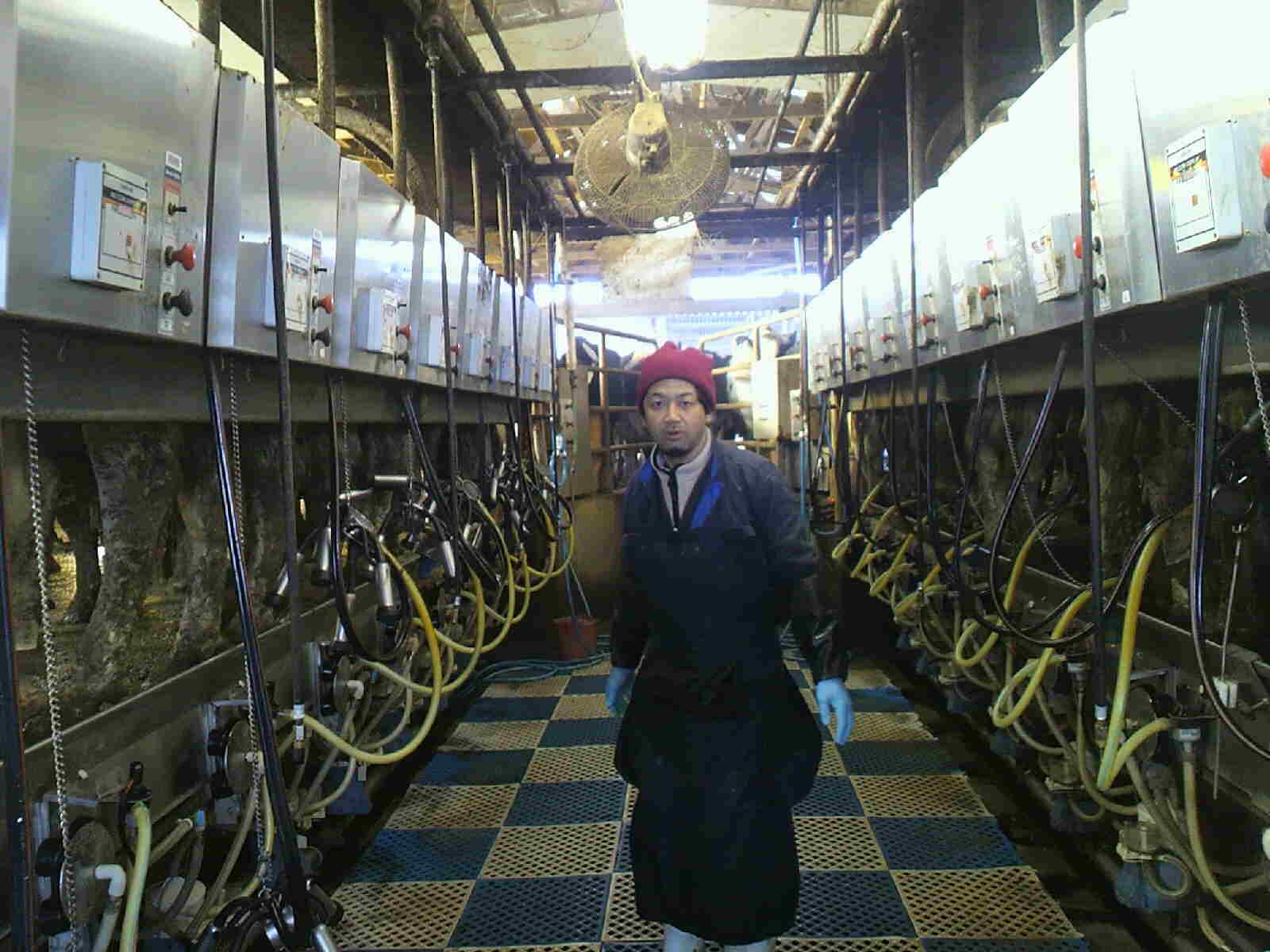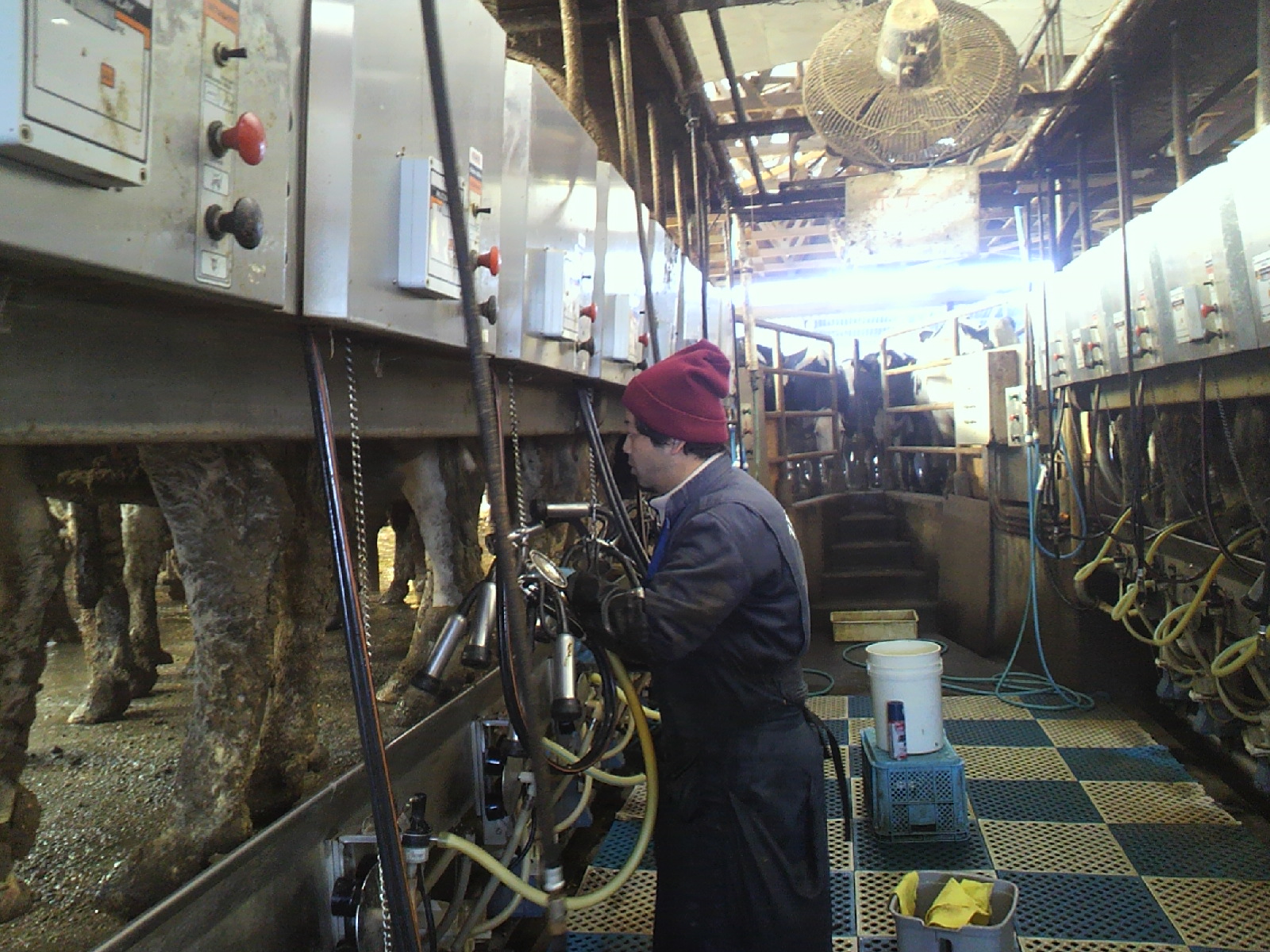|
Milking for the Future

(Credit: Courtesy of Yoshiyuki Hanzawa of Marumori, Miyagi, Japan, May
25)
Mr. Hanzawa starts shipping his milk since Friday 25. Although his farm
has not have any significant damages from the the Tohoku-Pacific Ocean
Earthquake on 11, electric black out had blocked him to milk for few days.
There are lots of challenges for his management in the future including
fears of radiaton coming from unstable nuclear plants in Fukushima 50 km
away from his farm. Consumers' reaction to milk produced in Tohoku area
is also what he is worried about.
But he got a good news today. The Miyagi prefectural government said radioactivity
in water and raw milk in the prefecture did not exceed the provisional
standard set by authorities.
These photos, taken by a mobile phone camera, are provided by Mr. Hanzawa.
Free for media use.
Mr. Hanzawa starts shipment of his raw milk (May 24)
Mr. Hanzawa has agree to provide us with his photos at the farm, but it takes a couple of days, because he is extremely busy, as we can easily imagine.
He shipped his 3.3 tons of milk today, the first time in two weeks. Although the amount is almost 70 percent of ordinary shipment level before the earthquake, he seemed to be happy. He says it is possible to keep shipping this level of milk every day.
Additional information on Hanzawa farm (May23)
He has 180 milking cows, and 10 ha of own pasture land and a contract based
silage corn and rice equivalent of 20 ha raised by other farms for his
cows.
Main pillar of the feeding is the formula feed consists of corn and other ingredients.
He also buys oats hey from Australia, and alfalfa from US.
Marumori town of Miyagi prefecture, where his farm is located, is one of the largest dairy areas in the prefecture with around 70 dairy farms.
He sells all his milk through Miyagi Ken-rakuren, a cooperative for local farmers.
He told me it is likely to start gathering raw milk from dairy farmers by Miyagi Ken-rakuren tomorrow, or March 24. It will be the first shipment of his milk in almost two weeks. He turned on the bulk cooling system for the preparation of the shipment from a day before yesterday.
He believes it is an important step toward the recovery.
Marumori town borders to Fukushima prefecture, where selling of raw milk was banned by the Japanese government. So he is very much worried if the levels of radioactive iodine and caesium in milk produced in the area get higher than standard set by the government.
But Yoshihiro MURAI, governor of Miyagi prefecture has told the prefecture has no intention to check the levels of radioactive iodine and caesium in food for the time being. And this policy makes Mr. Hanzawa relieved.
He is busy checking conditions of cows. Some cows have mastitis
Questions from a journalist in Sweden (March23)
1. How far is his farm from the nuclear power plant in Fukushima?
-60 kilo meters from the Fukushima nuclear plant.
2. On google map it looks like his farm is located on a hight, is that
right? Is that the reason why the tsunami did not strike his farm?
-His farm is located in a valley, but is more than 10 kilos from the sea. I believe that's why his farm was OK.
3. How was his farm struck by the earth quake? By the tsunami? By the
radiation from Fukushima power plant?
-He told me there was no serious damage on his farm and home by the quake, and tsunami.
Regarding to the radiation, I have no specific information. What he told me yesterday was he was worried about impact of radiation. It means he has not have any direct impact so far.
4. Can you tell a bit more about his biiggest worry right now, that he
can not sell the milk because consumers do not dare to drink it because
of risk of radiation.
-No. He can not sell his milk because of no means of transportation.
5. Can you give some facts about Mr. Hanzasa's farm: how many dairy cows
etcetera?
-I will check it later today.
6. What does he think about the future for his farm?
-I will check it later.
7. How badly hit is the agriculture sector in Sendai and Miyagi
prefecture? Can you give some figures please.
-I believe they are going to see very significant damage. A direct damage caused by the Tsunami and quake was severe in some parts of the prefecture along with Iwate, and Fukushima, but the total amount of damage is limited if you compare it to damage we are going to see.
Now media report in this country is heavily concentrate on safety of food, because radiation levels from several crops including spinach, some other vegetables, and milk from the area are much higher than regulation standards. Some are several hundreds higher.
It scares consumers. Farmers in the area, I mean not only the surrounding area of the plant, but also wide area of the Northeastern Japan are afraid of consumers' reaction to their produce. It is spring, and farmers are preparing to for planting vegetables, rice, and other stuff.
It is believed the levels look very high, but it is not a serious threat to human being.
8. In your opinion, what is the most important thing for farmers in
Sendai area and in Miyagi prefecture in the short term? In the long term?
-As I wrote above, consumer reaction is vital for the future of the Japanese agriculture.
Not only Sendai, or Miyagi, but also whole Japanese farmers are in a very difficult situation. The key is to how we can persuade consumers to think this scientifically.
Mail sent to Executives of IFAJ (March 22, 2011)
Dear friends,
We have lots of inquiries from journalist abroad who participated in the 2007 congress in Japan that farms visited are safe.
I have confirmed a dairy farmer whom some journalists participated in the congress met saying he and his family members are all safe.
He is Mr. Yoshiyuki HANZASA(43), owner of HANZAWA farm in Marumori, Miyagi prefecture, one of the largest dairy farms in the prefecture. He studied in Canada, so he does speak English, but has asked me to convey journalists abroad not call him directly, because he may not be able to deal with telephone interviews in such a mess situation. He can be interviewed through Masaru Yamada of the Japan Agricultural News.
What he told me are:
He and his family members are of all safe. Thanks for inquiries by journalists.
His farm did not have serious damages by the earthquake or tsunami on March 11.
His house had a slight damage.
He had electric black out right after the quake for 5 days. Then electric power became available until now.
He started milking on 13 after obtaining a generator, but onece a day.
Since electric power was available, he has increased number of milking to 2 times a day.
Ever since the quake, he has had to dump all the milk, because no way to
market it.
Regarding to feeding, he has reduced amount of feeding since the quake.
As of March 22, he has stock of feeding for only 10 days.
But he is optimistic because feeding facilities in Hokkaido and other places are going to supply feeding for farmers in the stricken area soon.
The most concern he has now is reaction from consumers due to news of contamination of radiation in Fukushima prefecture. Since his farm is near from Fukushima prefecture, he is worried about impact from the nuclear facilities.
His mapping data is 37.925378,140.790396 in google map
End
Using of this material for reports is free of charge. Please note a proper credit which should include "Courtesy of JAJA."
Please remind he is in very serous situation, and not trying to contact him directly.
If you have any extra questions on this, please send me a mail. I will try to reply you as soon as possible.
I will appreciate you to encourage your readers and listeners to donate for the people in the stricken area.
|
|
Mobile:+81-80-3210-6875
Email:masaru(at)yamada.net
The Japan Agricultural News
2-3 Akihabra, Taito, Tokyo 110-8722
Japan
Agricultural School of Meiji University
1-1-1 Higashimita, Tamaku, Kawasaki 214-8571 Japan
http://www.meiji.ac.jp/cip/english/



Direct interview with Yoshiyuki
(YAMADA, Masaru May 28)
There have been some inquiries from media abroad if he is available for
telephone interviews. But he is not comfortable so far to do it, because
he is extremely busy to fix his facilities and shape up his management
now. He told me he will be available in the near future when his business
back in track. Sorry for your inconvenience.
Report of the Irish Farmers Journal

(Sent by James Campbell, March 28)

Sent by Jan Olsson |
